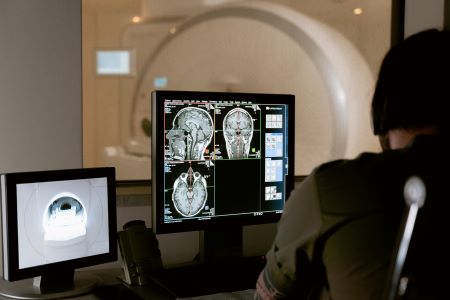How Severe Is Your TBI?
 A traumatic brain injury (TBI) is any injury that causes damage to the brain. This may occur as the result of shaking, a sudden change of movement, or direct impact to the head. TBIs range in magnitude from mild to severe.
A traumatic brain injury (TBI) is any injury that causes damage to the brain. This may occur as the result of shaking, a sudden change of movement, or direct impact to the head. TBIs range in magnitude from mild to severe.
Depending on the severity, a TBI may result in concussion, coma, or even death. If you or a loved one has experienced a TBI, it’s essential to get the proper medical screening and treatment.
Diagnosing a TBI
Doctors rely on diagnostic tools to determine the severity of a TBI. Methods of evaluation include:
- Imaging tests such as computerized tomography (CT scans) and MRI tests can determine the level brain bleeding and swelling.
- Blood tests such as the Bunyan Brain Trauma Indicator help doctors locate proteins that indicate a concussion or TBI.
- Neuropsychological testing may include a scoring system to describe the patient’s level of consciousness, such as the Glasgow Coma Scale.
Mild TBIs
The severity of a TBI is indicated by changes in consciousness caused by the traumatic event and the extent of its aftereffects. At the time of the traumatic event, a mild TBI may involve a brief alteration of consciousness that may last no more than 30 seconds, or the patient may lose consciousness for up to 15 minutes.
Evidence of a mild TBI may not appear on a brain scan. The short-term memory loss and confusion that result from a mild TBI generally go away within a few weeks. Doctors frequently rely on neuropsychological testing to assess the severity of mild TBI symptoms such as confusion and disorientation.
Symptoms of a mild TBI include:
- Nausea
- Neck pain
- Headache
- Dizziness
- Confusion
- Blurred vision
- Slowed reflexes
- Diminished reflexes
- Ringing in the ears
Moderate or Severe TBI
The traumatic event that results in a moderate to severe TBI may cause the patient to lose consciousness for an extended period of time. A patient who suffers from a moderate TBI may lose consciousness for up to six hours, and a patient who suffers a severe TBI may lose consciousness for more than six hours.
A moderate or severe TBI may have permanent effects on the patient’s brain, resulting in cognitive and developments problems and long-term memory loss. These symptoms may last for weeks or longer and require treatment at a rehabilitative center.
Symptoms of moderate to severe TBI include:
- Confusion
- Dilated pupils
- Slurred speech
- Nausea or vomiting
- Difficulty speaking
- Persistent headache
- Difficulty waking up
- Restlessness or agitation
- Changes in sleep patterns
- Sensitivity to light or smell
- Weakness or numbness in arms or legs
- Convulsions
- Seizures
- Coma
- Death
What Causes a TBI?
TBIs are usually caused by accidents. The most severe TBIs often result from a crushing or penetrating blow that may even involve a penetrating injury where a foreign object pierces the skull and touches the brain. Severe TBIs are more likely to require long-term care and may result in disability or death.
Common causes of TBIs include:
- Car accidents
- Motorcycle accidents
- Truck accidents
- Bicycle accidents
- Pedestrian accidents
- Slip and fall accidents
- Sports accidents
- Military service
- Assault
- Gunshot wounds
Have You Been Injured in an Accident Causing Traumatic Brain Injury?
If you or a loved one has been in an accident that caused a TBI, your Omaha brain injury lawyer will conduct an investigation to find out whose negligence caused your injuries. Then they can file a claim seeking damages to cover the cost of your medical care and other expenses related to the accident.
At Bottlinger Law L.L.C., we handle cases in Nebraska, Iowa, Texas, and throughout the Midwest. Call (402) 505-8234 today to schedule your FREE consultation. We’re here to help.
Bottlinger Law
Consultation Form
Our legal team is ready to help. Please fill out the form below to set up a free consultation with the Bottlinger Law team.